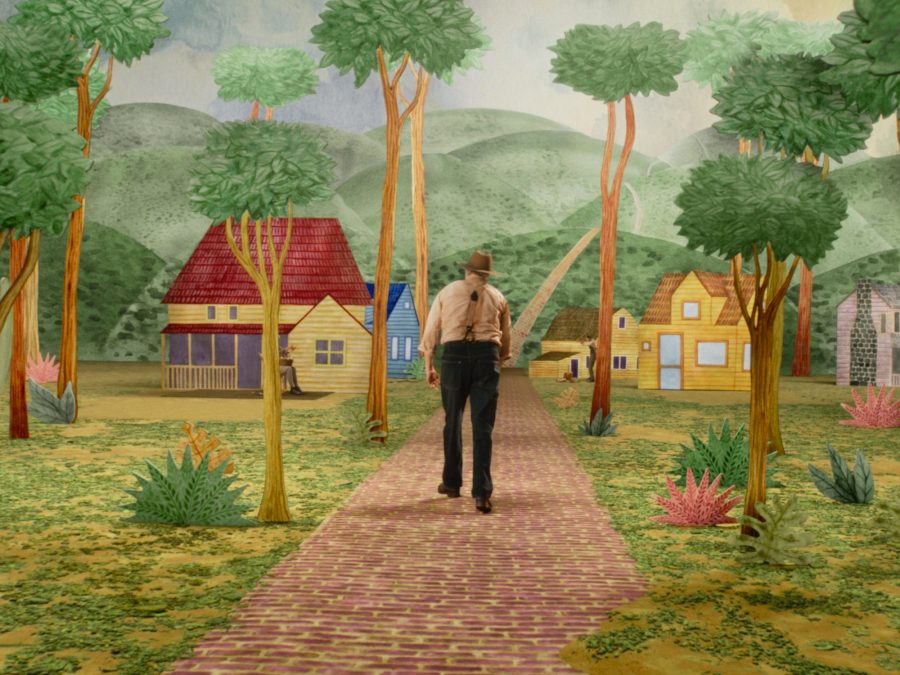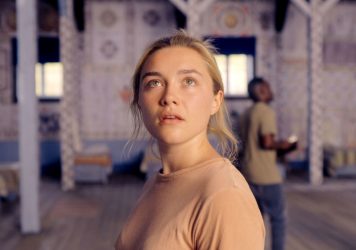Joaquin Phoenix plays a chronically nervous man on a mission to get home in Ari Aster's scattered third feature.
While Ari Aster’s third film was in production, it was rumoured to be titled Disappointment Boulevard – a tidbit that was debunked when its release date was announced, along with the actual name, Beau is Afraid. While the official title makes logical sense considering the chronic state of perma-anxiety experienced by Aster’s protagonist, it does lack a certain mystique that its debunked predecessor had in spades.
Beau is Afraid as a descriptor might be coldly accurate, but it also serves as an unwitting albatross around the film’s neck. Stuck in a grave state of arrested development, Beau’s journey is entirely literal. Beau is, was, and seemingly always will be, afraid.
We open on a session with a therapist (a classic Stephen McKinley Henderson appearance) as the paunchy, balding, chronically nervous Beau Wassermann (Joaquin Phoenix) mentions an upcoming trip to visit his mother Mona (Patti LuPone). The therapist hints that the relationship between Mona and Beau is difficult; Beau minimises his concerns, expressing happiness at being able to see her.
Unfortunately a series of unfortunate mishaps in his neighbourhood – including the presence of a deadly brown recluse spider, a noisy neighbour, a medication snafu, a robbery and getting locked out of his apartment building – prevent Beau from making it to the airport in time for his flight. When he relays this information to his mother, she appears incensed by what she takes to be a personal slight rather than an honest mistake. Beau, dismayed at the thought of disappointing his mother, embarks on a perilous journey back to visit her.
This pilgrimage brings Beau into contact with a colourful cast of characters, from kindly couple Grace (Amy Ryan) and Roger (Nathan Lane), their vicious teenage daughter Toni (Kylie Rogers) and their disturbed lodger Jeeves (Denis Ménochet) to his brief childhood sweetheart Elaine (Parker Posey) and a troupe of woodland dramatists, who count the sweet Penelope (Hayley Squires) among their number. Aster has cited The Wizard of Oz as a direct influence, but these encounters do little to change Beau, or bring him closer to his goal of reuniting with his mother.

In fact, Beau remains as he is when we first meet him. The only thing that really changes is the physical manner in which Phoenix’s face is warped by fear, a live-action iteration of Courage the Cowardly Dog. Phoenix, an unshakeably compelling and committed actor, isn’t given much to do with the character, whose emotional range varies only from ‘mildly disconcerted’ to ‘freaking the f*** out’. Sadly it’s the same for LuPone’s Mona, presented as an overbearing hag with a psychosexual obsession with her son. Parker Posey is the obvious standout, despite her brief screen time.
Still, Aster has never been much for the character study – Hereditary and Midsommar were also mounted on the strength of spectacle, and that at least, the director commits to. This is a more ambitious film in its execution, featuring distinct tonal and visual shifts and many varied settings, from a dank city apartment to a magical forest. An entire sequence staged as a play is the film’s big swing, and perhaps its most poignant moment, but it becomes overshadowed by more juvenile flourishes, such as a giant, crude manifestation of Beau’s entrenched mommy issues. This amounts to a finished product that has all of Charlie Kaufman’s weirdness but none of his self-awareness.
Such swinging for the fences is admirable in the age of the monolithic studio filmmaking that dominates the box office, and Aster continues to march to the beat of his own drum, but Beau is Afraid doesn’t quite hang together with the ease of his previous two features. It’s a shame, as there are some interesting ideas that emerge (Beau living in the shadow of his mother’s greatness; Beau attempting to reckon with the trauma of his childhood; Beau, middle-aged, fumbling through romance) but after three hours, we are very much in the same place as we were when the film started. This is a road movie that quickly seems to run out of road, ambling erratically down a dirt path to nowhere until coming to an abrupt, unsatisfying stop.
It’s not an entirely unpleasant journey, but the film does have a jarring, unfinished feel to it, and while the detail-oriented might find it novel to unpack its myriad cinematic homages, and Aster’s ambitious execution is worthy of celebration, ultimately it’s an uneven ride, particularly given the incredible talent involved.
Little White Lies is committed to championing great movies and the talented people who make them.
Published 11 Apr 2023
Three hour epic ft. Joaquin Phoenix you say?!
Less emphasis on 'epic' and more on 'three hours'.
Ambitious but scattered psychodrama with one-note Phoenix.

A painful sense of impending dread fills every frame of Ari Aster’s searing cinematic debut.

Charlie Kaufman presents a mind-bending psychodrama about a young woman’s journey to meet her boyfriend’s parents.

Florence Pugh runs afoul of a Swedish cult in director Ari Aster’s toothless follow-up to Hereditary.